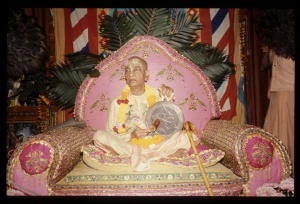CC Antya 5.114 (1975): Difference between revisions
(Vanibot #0027: CCMirror - Mirror CC's 1996 edition to form a basis for 1975) |
(Vanibot #0020: VersionCompareLinker - added a link to the Version Compare feature) |
||
| Line 2: | Line 2: | ||
<div style="float:left">'''[[Sri Caitanya-caritamrta (1975)|Śrī Caitanya-caritāmṛta (1975)]] - [[CC Antya (1975)|Antya-līlā]] - [[CC Antya 5 (1975)|Chapter 5: How Pradyumna Miśra Received Instructions from Rāmānanda Rāya]]'''</div> | <div style="float:left">'''[[Sri Caitanya-caritamrta (1975)|Śrī Caitanya-caritāmṛta (1975)]] - [[CC Antya (1975)|Antya-līlā]] - [[CC Antya 5 (1975)|Chapter 5: How Pradyumna Miśra Received Instructions from Rāmānanda Rāya]]'''</div> | ||
<div style="float:right">[[File:Go-previous.png|link=CC Antya 5.113 (1975)|Antya-līlā 5.113]] '''[[CC Antya 5.113 (1975)|Antya-līlā 5.113]] - [[CC Antya 5.115 (1975)|Antya-līlā 5.115]]''' [[File:Go-next.png|link=CC Antya 5.115 (1975)|Antya-līlā 5.115]]</div> | <div style="float:right">[[File:Go-previous.png|link=CC Antya 5.113 (1975)|Antya-līlā 5.113]] '''[[CC Antya 5.113 (1975)|Antya-līlā 5.113]] - [[CC Antya 5.115 (1975)|Antya-līlā 5.115]]''' [[File:Go-next.png|link=CC Antya 5.115 (1975)|Antya-līlā 5.115]]</div> | ||
{{CompareVersions|CC|Antya 5.114|CC 1975|CC 1996}} | |||
{{RandomImage}} | {{RandomImage}} | ||
==== TEXT 114 ==== | ==== TEXT 114 ==== | ||
<div class="verse"> | <div class="verse"> | ||
:kavi kahe, | :kavi kahe,--'jagannātha--sundara-śarīra | ||
:caitanya- | :caitanya-gosāñi--śarīrī mahā-dhīra | ||
</div> | </div> | ||
| Line 25: | Line 24: | ||
<div class="translation"> | <div class="translation"> | ||
The poet said, | The poet said, "Lord Jagannātha is a most beautiful body, and Śrī Caitanya Mahāprabhu, who is exceptionally grave, is the owner of that body. | ||
</div> | </div> | ||
| Line 32: | Line 31: | ||
<div class="purport"> | <div class="purport"> | ||
Śarīrī refers to a person who owns the śarīra, or body. As stated in | Śarīrī refers to a person who owns the śarīra, or body. As stated in Bhagavad-gītā: | ||
:dehino | :dehino 'smin yathā dehe | ||
:tathā dehāntara-prāptir dhīras tatra na muhyati | :kaumāraṁ yauvanaṁ jarā | ||
:tathā dehāntara-prāptir | |||
:dhīras tatra na muhyati | |||
"As the embodied soul continually passes, in this body, from boyhood to youth to old age, the soul similarly passes into another body at death. The self-realized soul is not bewildered by such a change." ([[BG 2.13 (1972)|Bg. 2.13]]) For the ordinary living being in material existence there is a division or distinction between the body and the owner of the body. In spiritual existence, however, there is no such distinction, for the body is the owner himself and the owner is the body itself. In spiritual existence, everything must be spiritual. Therefore there is no distinction between the body and its owner. | |||
</div> | </div> | ||
Latest revision as of 02:22, 27 January 2020

A.C. Bhaktivedanta Swami Prabhupada
TEXT 114
- kavi kahe,--'jagannātha--sundara-śarīra
- caitanya-gosāñi--śarīrī mahā-dhīra
SYNONYMS
kavi kahe—the poet said; jagannātha—Lord Jagannātha; sundara-śarīra—very beautiful body; caitanya-gosāñi—Śrī Caitanya Mahāprabhu; śarīrī—possessor of the body; mahā-dhīra—very grave.
TRANSLATION
The poet said, "Lord Jagannātha is a most beautiful body, and Śrī Caitanya Mahāprabhu, who is exceptionally grave, is the owner of that body.
PURPORT
Śarīrī refers to a person who owns the śarīra, or body. As stated in Bhagavad-gītā:
- dehino 'smin yathā dehe
- kaumāraṁ yauvanaṁ jarā
- tathā dehāntara-prāptir
- dhīras tatra na muhyati
"As the embodied soul continually passes, in this body, from boyhood to youth to old age, the soul similarly passes into another body at death. The self-realized soul is not bewildered by such a change." (Bg. 2.13) For the ordinary living being in material existence there is a division or distinction between the body and the owner of the body. In spiritual existence, however, there is no such distinction, for the body is the owner himself and the owner is the body itself. In spiritual existence, everything must be spiritual. Therefore there is no distinction between the body and its owner.